
Understand your company's position and learn more about the options available
Require Immediate Support? Free Director Helpline: 0800 644 6080
Free Director Helpline: 0800 644 6080
Updated:
When an insolvent limited company enters liquidation, one of the liquidator’s key duties is to investigate the causes of its financial decline. This includes looking into the conduct of directors during the time leading up to insolvency.
Their findings are incorporated into a director’s report, with a recommendation regarding any further action that may be needed. The report is then sent to the Insolvency Service, who acts for the Secretary of State, for further scrutiny on whether civil or criminal wrongdoing has taken place. If criminal activity is suspected, the case may be passed to the police.
Free 60 Second Test
For Ltd Company Directors
What are you looking to do?
Choose below:
Director conduct is a major issue in the liquidation of a company. Under the Companies Act, 2006, directors take on a range of responsibilities and are obliged to fulfil certain duties, one of which is being fully aware of their company’s financial position at all times.
Once a director knows - or ought to know - that their company is insolvent, they have a number of legal responsibilities that they must adhere to. One of these is to prioritise the interests of creditors over those of the directors and shareholders. In practice, this means not engaging in any activities which could increase creditor losses or worsen their position. Actions which should be avoided include obtaining further credit, disposing of company assets for under their true market value, and paying some creditors at the expense of others.
This helps to protect creditors from suffering further financial losses, and outs the onus on the company to act quickly at the early signs of insolvency. If a director is found to have acted wrongfully or unlawfully, or their conduct is in any way to blame for the company’s demise, the director’s report will provide detailed information.
When a company becomes insolvent it is often the case that it needs to cease trading immediately in order to halt any further decline. The route forward is best determined by a licensed insolvency practitioner who can assess the position of the company and advise on the best next steps.

Get a Quote Find Your Nearest Office
An insolvency practitioner is duty-bound to conduct an investigation into the conduct of an insolvent company's director during the period leading up to its financial decline. If suspicious transactions - such as selling assets at undervalue or prioritising certain creditors over others - are discovered, a report will be submitted to the Insolvency Service who will determine the outcome.
UK’s number one for director advice
We handle more corporate insolvency appointments than any other UK firm; demonstrating our commitment to helping directors and business owners in financial distress.
The team are available now - 0800 644 6080
Get a Quote Find Your Nearest Office
Directors found guilty of wrongdoing can face a number of penalties depending on the severity of their actions. Sanctions can include:
If you’re concerned about an investigation following the liquidation of your company, or you would like more information, Real Business Rescue can help. We’ll establish where you stand as a director of an insolvent company, and provide the reliable guidance you need. Please contact one of our partner-led team – we offer free same-day consultations and operate a network of offices throughout the UK.
Still unsure whether liquidation is right for your company? Don't worry, the experts at Real Business Rescue are here to help. Our licensed insolvency practitioners will take the time to understand the problems your company is facing before recommending the best course of action going forward based on your own unique circumstances.

Complete the below to get in touch
For Ltd Company Directors
What are you looking to do?
Choose below:
We provide free confidential advice with absolutely no obligation.
Our expert and non-judgemental team are ready to assist directors and stakeholders today.

Understand your company's position and learn more about the options available

Find your nearest office - we have more than 100 across the UK. Remote Video Meetings are also available.

Free, confidential, and trusted advice for company directors across the UK.